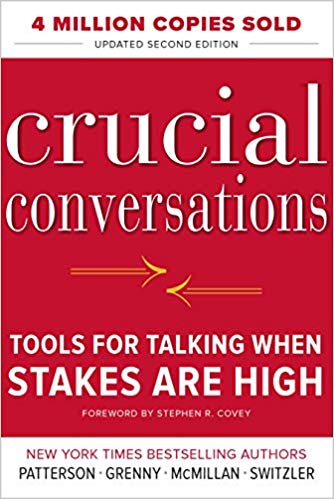

This article is an excerpt from the Shortform summary of "Crucial Conversations" by Kerry Patterson. Shortform has the world's best summaries of books you should be reading.
Like this article? Sign up for a free trial here .
What is a conversation style? How does a conversation style alter how you talk about difficult topics or have crucial conversations?
During crucial conversations, conversation style can mean a significant difference in communication. But you can learn to take someone else’s conversation style into account, and learn to communicate better.
Conversation Style: The Pool of Meaning
What is the “conversation style” definition? The conversation style definition is the choices people make in a conversation, whether it’s to hold back, depend on body language, or tend towards a fool’s choice.
Each of us brings to conversations our own feelings, ideas, and experiences. This information constitutes our personal pool of meaning, which drives our actions.
When people engage in a crucial conversation, they add their unique information to a shared pool of meaning. It’s important that all opinions be reflected in the shared pool so the best quality decisions can be made. Everyone should feel comfortable contributing their information — even if it’s unpopular or controversial.
As people contribute, the shared pool of meaning expands to encompass more useful and more accurate information, and collectively they make better decisions. Another way to look at it is, a pool of information reflects the group’s IQ — the higher the IQ, the better the decisions.
A quality decision is the payoff for the time invested in sharing and discussion.
Conversation Style 1: When People Hold Back
When people withhold what they know either intentionally or because they don’t know how to present it, the shared pool of information is shallow. This results in several problems:
- With incomplete information, groups can collectively do stupid things. For example, a woman entered the hospital for a tonsillectomy, but instead, the surgeon removed her foot. Others on the surgical team wondered why, but no one said anything for fear of angering the surgeon (a fool’s choice). In all arenas, people tend to hold back their information rather than risk angering someone in power.
- When people aren’t invested in the process, they’re not committed to the final decision. They may passively resist or criticize. As the satirical author Samuel Butler put it: “He that complies against his will is of his own opinion still.”
- If they don’t know how to communicate, they act counterproductively, including silence, hints, sarcasm, playing the martyr, or pressuring others to accept their point of view by using tactics such as manipulation, monologues, or verbal attacks.
Conversation Style 2: When People Share Freely
When people freely add to the shared pool of meaning:
- The collective knowledge increases a group’s ability to make better decisions.
- People build on each others’ ideas until they come up with an alternative no one previously thought of.
- The whole (final choice) is better than the sum of the parts.
- People are more likely to follow through on whatever decisions they make since the discussion was participatory.
- They’re committed to the shared solution because they understand why it’s the best one. The time invested in discussion up front results in more unified and committed action. Conversely, when people are not unified and committed, implementation falls apart.
Making Conversations Work
For successful crucial conversations, we must:
- Share our unique information.
- Get others to share their information.
- Make it safe to discuss controversial matters.
- Amass a shared pool of information.
Fortunately, dialogue skills are learnable. When you develop the skills to master crucial conversations you can transform them from upsetting events to productive discussions.
The rest of the book explains how you can create conditions conducive to dialogue. You’ll learn to:
- Identify your conversation style when stressed.
- Control your emotions.
- Watch for and catch dialogue-ending problems before they get out of hand.
- Create safe conditions for dialogue.
- Express feedback respectfully.
- Be persuasive, not off-putting.
- Encourage people to share their views.
- Transition from discussion to action.
Conversation style varies from person to person, and someone’s style can be as unique as they are. It’s best to learn to pay attention and stay tuned in to all possibilities.
Conversation Style: Dialogue is Powerful
Many people make the mistake in crucial conversations of believing they have to make unpalatable either/or choices, for instance, 1) choose between telling the truth about a problem vs. 2) staying silent to preserve a relationship with a boss, coworker, or loved one.
Believing you have only two problematic alternatives to choose from is a fool’s choice. There are always more alternatives. You can discover these by thinking carefully about your own conversation style definition, and why it matters. Do you tend to make the fool’s choice?
We’ve all made the fool’s choice to not say anything about issues with bosses, family, and friends. The consequences can be unfortunate: In the workplace, it can lead to terrible decisions; in personal relationships, it can create misery when partners are afraid to speak up.
Here’s an example of how employee silence can affect a company. The leaders of a company are planning to move its headquarters for flawed reasons. If the employees make a fool’s choice and fail to point out potential downsides for fear of retribution, company leaders will make a decision with harmful future consequences and waste money.
But there’s another option: A manager can speak up honestly and also preserve the relationship by using dialogue skills to be persuasive and respectful. If she succeeds the leadership may listen and revise the moving plans.
Dialogue Replaces the Fool’s Choice
The key to successful conversations is getting all relevant information on the table.
When people express their opinions honestly, share their feelings, and articulate ideas — even if their ideas are controversial or unpopular — the result is dialogue, the free exchange of meaning or information.
Each of us brings to conversations our own feelings, ideas, and experiences. This information constitutes our personal pool of meaning, which drives our actions.
When people engage in a crucial conversation, they add their unique information to a shared pool of meaning. It’s important that all opinions be reflected in the shared pool so the best quality decisions can be made. Everyone should feel comfortable contributing their information — even if it’s unpopular or controversial.
Understanding someone’s conversation style can make a huge difference in the result of a crucial conversation. While there are many universal tips and best practices for crucial conversations, knowing and adapting to conversation style also plays an important role.

———End of Preview———
Like what you just read? Read the rest of the world's best summary of Kerry Patterson's "Crucial Conversations" at Shortform .
Here's what you'll find in our full Crucial Conversations summary :
- How to approach an argument without getting mad
- The mistakes most people make when trying to listen to someone else
- How to come up with win-win solutions that make everyone happy






